Postcards from the Practice: Students describe their summer law experiences
Internships and summer associate positions at law firms, government agencies, and non-profits give students valuable work experience and opportunities to network and hone their career interests. Here's how some Duke Law students spent the summers.
This month, eight Duke Law students told us about their summer experiences for the annual social media series Postcards from the Practice. Their full reports can be viewed on Duke Law’s Facebook, LinkedIn, and Instagram accounts. Following are highlights from their stories.
Ashari Hankerson ’25
2L Special Matters and Investigation Summer Associate, King and Spalding, Atlanta
What interested you about this opportunity?
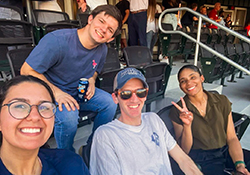
Before and during law school, I was always interested in white collar and government work. The Corporate Crime class I took with Professor Buell solidified that interest. Being a summer associate within the group shed even more light onto my interests with the variety of matters I handled over the summer.
What were some of the highlights?
Getting so much substantive work, which afforded me amazing opportunities that most summer associates don't experience. Also, partaking in the K&S Connect program, where I got to visit the D.C. office and network with more attorneys and, of course, see friends.
What insights did you glean from your summer?
With work comes reality, and the reality is that practicing law is difficult and sometimes takes more of your time. But the work is interesting and complex. And with the challenges you may face, you are consistently growing and learning.
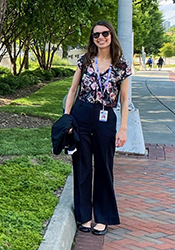
Allyson Barkley JD/MPP ’25
Legal Intern, Durham City Attorney's Office
What interested you about this opportunity?
I have been interested in state and local government work for many years. I loved working for the city two years ago, when I interned with the Durham Community Safety Department for my master's.
While in law school, I have realized that I am a generalist - I enjoy work that allows me to delve into a lot of different issues and legal questions. Working in the CAO allows you to do just that; no day is the same. Most importantly, attorneys and staff are a crucial part of the team that makes Durham such a great place to live.
How did you spend your days?
I was assigned two attorneys and their departmental portfolios. So, whenever a legal question arose from one of those departments, I helped do research and write up or present my takeaways to help the department make a decision on the best course of action.
Did it have any impact on how you think about your career plans?
It reinforced my goal of becoming a municipal lawyer after graduation. I really enjoyed the experience and can definitely see a career in municipal or county law. The fast-paced, client-facing work is exactly what I hope to do long-term.
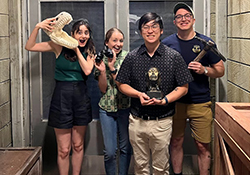
Jungi Hong ’25
Summer Associate, U.S. Government Accountability Office, Washington, D.C.
What interested you about this opportunity?
I was looking for a federal agency that was well-regarded to work for and had a strong mission. Also, I was drawn to federal agencies because I felt they were a good balance of work and life. I ended up talking to two alumni about their roles and that helped me on my application and interviewing process. It also helped it was a rare job, being a government internship with a potential return offer.
What were some of your duties?
The GAO ‘splits’ the summer. My first six weeks I was in the Procurement Law group, which drafts decisions with big protests between agencies and contractors. My second six weeks was with the auditing team called Financial Markets and Community Investment. I was assigned a research memo on the impact of a recent Supreme Court decision and observed team meetings.
Did it reinforce your plan to pursue an agency career?
I definitely hope to return to the GAO if I can, although I won’t hear about return offers until after Labor Day. I like the pace of work and hours at a federal agency, and I love that the work culture is geared towards work-life balance and public service. Also, I would be open to a fully remote job, which I hadn’t considered before, but many attorneys in the office are.
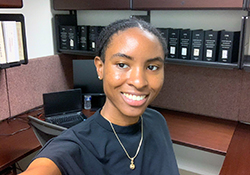
Maia Stephenson ’25
Summer Associate, U.S. Government Accountability Office, Washington, D.C.
What interested you about this opportunity?
My interest in government work led me to intern at the N.J. Atty. Gen. Office during the summer of my 1L year. There, I gained experience with both state and federal regulation. I found myself particularly drawn to federal work. The GAO interested me because it presented a unique opportunity to engage with a broad range of issues within a single federal institution. Working as a summer associate at the GAO offered exposure to a broad range of legal areas, allowing me to explore different facets of law and understand how they intersect within the government.
Were there networking and mentorship activities?
Yes, there were ample opportunities for both mentorship and networking. We were provided with a mentor who had participated in the program before, offering valuable tips and advice from a non-supervisory perspective. I also collaborated closely with line attorneys on different projects, and it was encouraged to reach out to attorneys from other teams if interested. Additionally, program coordinators were also available for discussions, and there were numerous events organized for interns to meet and get to know the attorneys.
Did any experience especially stand out?
One highlight from this summer was working on a decision of “first impressions” involving a novel legal issue. Due to the specific facts of the protest, there was no precedent to rely on. This presented a unique challenge and an exciting opportunity for me to collaborate with several senior attorneys. Together, we engaged in in-depth discussions and brainstorming sessions to develop a comprehensive strategy tailored to the novel issues at hand.
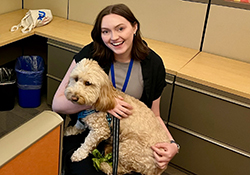
Olivia Callan ’25
Legal-Policy Intern, ACLU of Northern California Immigrants’ Rights Project
What interested you about this opportunity?
On a professional level, I was drawn to this position because it offered the opportunity to engage in impact litigation, legislative and policy advocacy, and community education on immigration issues in California. On a personal note, I’m the granddaughter of a Chinese immigrant and was born in Northern California, so working on immigration issues in California was the perfect fit.
What was the highlight of your experience?
The opportunity to advocate on behalf of detained folks and to use skills that I’ve developed in law school. This summer, I interviewed individuals in ICE detention centers in California for the fact development stage of two different cases. Although it was emotionally challenging and difficult to navigate at times, I had excellent training through my experiences at Duke. For instance, in my 2L spring semester, I was a student attorney with the Immigrant Rights Clinic and interviewed a family for their asylum case. I also did a Duke Immigrant and Refugee Project pro bono project with the Southern Poverty Law Center, interviewing detained folks in the Stewart Detention Center. These gave me a solid foundation for fact development, issue-spotting, and interviewing skills, so I immediately felt comfortable jumping into interviews this summer.
Did it have any impact on your career plans?
ACLU NorCal confirmed my passion for immigration and reaffirmed my general passion for public interest impact litigation. The attorneys I worked with gave invaluable advice that I will use as I start my career as a public interest lawyer.
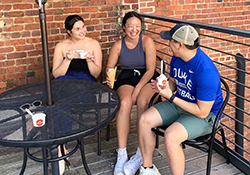
Emily Fung ’25
Law Clerk, Legal Advocacy Team, National Center for Youth Law (worked remotely from Durham)
What interested you about this opportunity?
One of my role models clerked with NCYL a few years ago, and the organization has been on my radar for a while. I was interested in observing how one organization can house a wide range of focus areas across youth law. I wanted to spend my 2L summer learning about impact litigation, which is the focus of NCYL’s Legal Advocacy team. I’d often heard during 1L that public interest students should be thoughtful about methodology — not just subject area — during job searches, whether that means exploring different methodologies or targeting one, and I’ve found that advice valuable.
Can you name a highlight from your summer experience?
Many of them! I meet weekly with my supervisor, and I meet weekly with an assigned mentor. Also, the twelve of us summer clerks were assigned to a rotating, one-on-one virtual coffee chat. Most or all of the clerks plan to stay in the youth and education space, and it’s been helpful, and interesting, for us to talk through our thoughts together. I also cold emailed a NCYL attorney halfway through the summer and learned a bunch from him.
Did the experience change the way you think about your career plans?
I feel better equipped to make postgraduate decisions now that I’ve explored a few different methodologies within youth law—both because I now have a better understanding of how all this work fits together and how my own skill set relates to the work. Also, although NCYL has hubs in D.C. and Oakland, it has attorneys all over the country, and many of them work remotely at least some of the time. This summer confirmed that I love this type of environment!
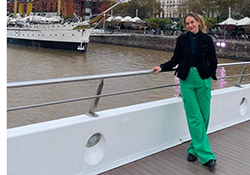
Julia Benbenek JD/LLM ’26
Summer Associate, Dentons Rattagan Arocena, Buenos Aires, Argentina
What interested you about this opportunity?
My background in Spanish studies sparked my interest in working in a Spanish-speaking country to fine-tune my lingual skills and gain exposure to Latin work culture.
What were some of the highlights of working in Argentina?
One of the highlights of the work was familiarizing myself with Argentina’s civil law system, its judiciary, and federal structure. Outside of work, the high-quality and well-priced beef was a top highlight. I relished both the backyard parillas with co-workers and friends, as well as the upscale parillas, including the globally acclaimed Don Julio.
How has the experience informed your future career plans?
Overall, the experience reaffirmed my drive to practice international arbitration in Miami following my graduation from law school. My experience in Argentina will certainly be a crucial asset in navigating client relationships with Latin American ties in Miami — often referred to as the gateway to Latin America.
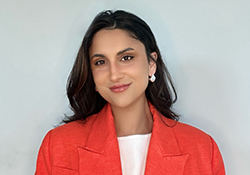
Briana Megid ’25
Litigation & Policy Intern, the Bazelon Center for Mental Health Law
What interested you about this opportunity?
In high school, I lost my boyfriend and three classmates to suicide. At 15, I started volunteering with the American Foundation for Suicide Prevention in search of direction and understanding. Through this work, I learned about the Bazelon Center and its tireless work to preserve the civil rights of individuals living with mental disabilities.
What were some of your duties?
After a year of clinic work at Duke, I could jump into ongoing litigation work and tactfully approach my assignments – from meeting with co-counsel to proposing and actuating legal strategies. As a policy wonk, I tracked and red-lined legislation. During my internship, I attended numerous congressional meetings with multiple offices on Capitol Hill.
Did you enjoy the networking and mentorship opportunities?
The Bazelon Center is like a family – I loved my supervisor, who gave me the deference and autonomy to lead and grow. She took the time to ensure my work aligned with my interests and took it upon herself to mentor me, both in and out of the internship. I’m immensely grateful for her kindness, humility, and expertise.